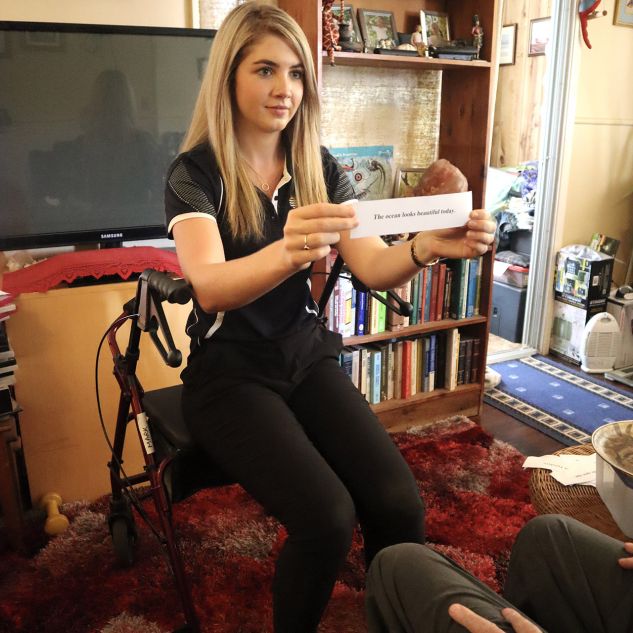Written By
Nicolette Ward
College/Division
College of Healthcare Sciences
Publish Date
16 November 2021
Related Study Areas
The benefits of taking a gap year or three
For Townsville local and JCU final year speech pathology student, Elise Teitzel, it took a six-year gap between leaving school and figuring out what her dream career might be. She shares her story about pursuing her future.
I started my studies at JCU at the age of 23. The thought of going to university after leaving school was actually a bit scary at the time and I just didn’t feel ready. Although I did relatively well at school, it was only when I started seeing my friends graduate from university that I finally thought that maybe I could do that, too.
So I went travelling after school for a few years, working as a nanny and then working in childcare when I got back home. Seeing some of the kids at the childcare centre have difficulties with their pronunciation and articulation of speech sounds really sparked my interest in wanting to know how to help them better.


Experience has no substitute
Now in her final year of speech pathology studies at JCU, Elise says it was the clinical experience placements that really opened her eyes to the diverse healthcare role that a speech pathologist plays.
My first placement was at Mount Isa in a community rehabilitation setting, working with adult patients and helping them after they’ve been discharged from hospital, often recovering from stroke or other neurological conditions like Parkinson’s disease or dementia. I was part of the allied health team, working with physiotherapists and exercise physiologists, and many of the therapy sessions were conducted collaboratively. I also had the opportunity to provide individual speech therapy to some clients in their homes which was a great experience.
My next placement was at Hervey Bay, working with the Child Development Services unit which was essentially an assessment clinic for children with complex medical and psychosocial backgrounds. I got to work within a multidisciplinary allied health team made up of a speech pathologist, physiotherapist and occupational therapist and we would see children aged 0-6. We would assess them so they could be referred to ongoing therapies or other services they might need.
I really enjoyed both of my placements because I got to learn about some of the different settings that a speech pathologist can work in. I also learnt so much about the roles of other allied health professions which has helped me to recognise when someone might need extra support from another discipline.


Finding her place
Although Elise’s original preference was to work specifically with children after graduating, she has since become more interested in working with patients across the lifespan.
The sounds that kids make first and how they learn the rules of language is also very applicable to adult speech therapy, especially those who have just survived a stroke or brain injury. Issues around swallowing are also often common for people with neurological conditions and is one of those basic functions that just gets taken for granted, but really is so fundamental to quality of life.
I find neurology fascinating and have loved learning about how the specific nerve functions are responsible for moving the tongue and other parts of your mouth, and how this influences not only communication but also swallowing.
Swallowing is an area of speech pathology that many people aren’t familiar with, but it’s quite a major part of it. Some babies also may not have a strong swallowing reflex, and can have difficulty adjusting to feeding, so this is another important area where a speech pathologist can help.
Another area of interest that Elise has developed from her studies has been learning about the voice, as separate from speech.
I have worked as a singer/performer, so I found the study of voice that we covered in the speech pathology course to be really relevant to that. We did a whole subject on how voice is produced and all the things that can go wrong with that and how to remedy it. It’s made me a lot more aware of how to take care of my voice when I’m performing.


For anyone considering a career in speech pathology, Elise says it’s never too late to start your studies.
Everyone's ready to start their studies at different times and it may not necessarily be right after school. I found going to the JCU Open Day was really helpful as you learn about what to expect and get to meet some of the lecturers and students.
My other advice would be to pace yourself throughout the degree when you need to. The speech pathology degree is four years full-time, but I did mine in five years as I wanted to start first year as a part-time student and give myself more time to get adjusted to uni life. I’m glad I did this because the first year really lays down the foundations for the rest of the degree, so pacing myself through those subjects helped me get through the rest of the course.
JCU also offers a lot of support for students. There is a student peer mentoring service for some tricky subjects like anatomy and physiology that I went to and which really helped. There's a lot of help available if you need it.
"Seeing some of the kids at the childcare centre have difficulties with their pronunciation and articulation of speech sounds really sparked my interest in wanting to know how to help them better... I find neurology fascinating and have loved learning about how the specific nerve functions are responsible for moving the tongue and other parts of your mouth, and how this influences not only communication but also swallowing."
JCU Speech Pathology Student Elise Teitzel